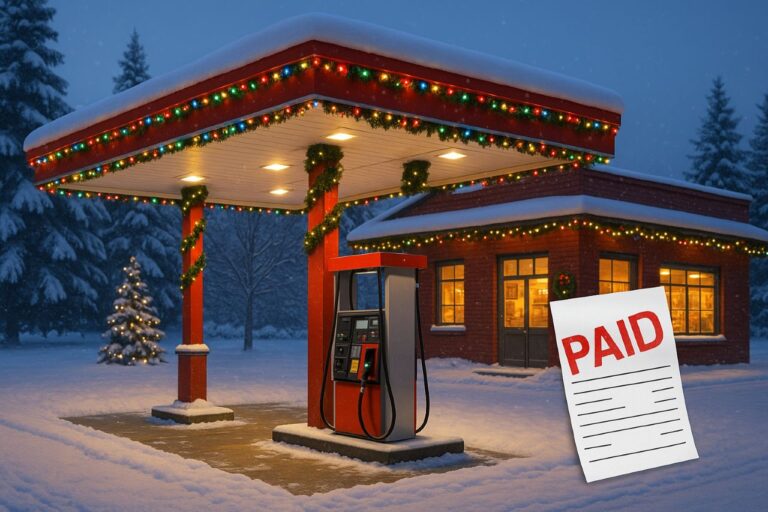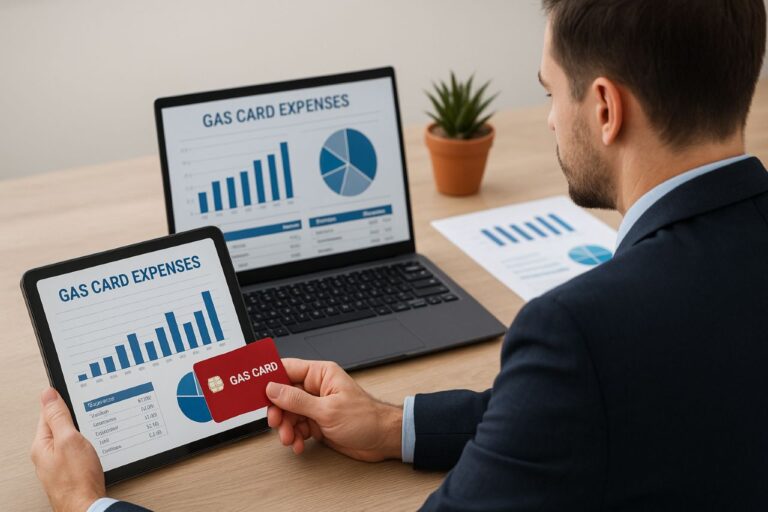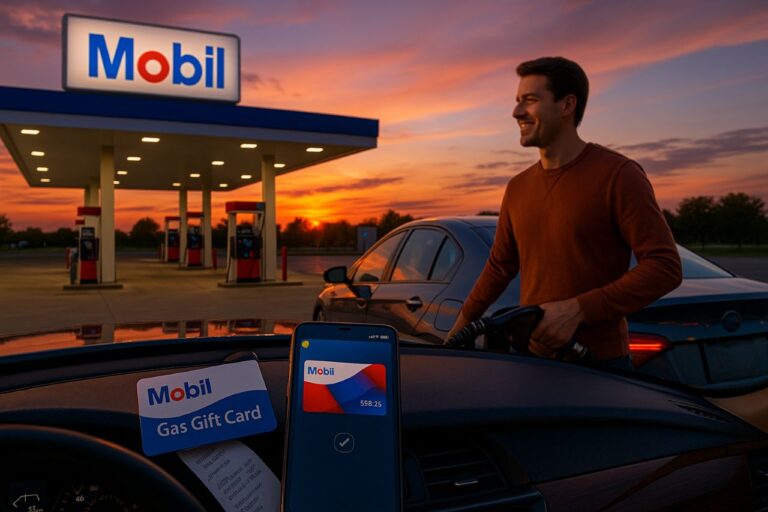Business Gas Cards: 7 Powerful Ways to Slash Your Fuel Costs
Business gas cards are now a necessary financial tool for businesses of all sizes that have vehicle fleets. Whether you have a delivery company, a construction team, or a sales force, fuel costs can take up a huge chunk of your budget. With the price of gas changing constantly, the need to find efficient methods to contain and cut these costs is greater than ever before.
That’s where business gas cards enter the picture. They provide more than a method of paying at the pump. They have fuel savings, tracking features, and spending limits that can make your operations run more efficiently and save more money. This article discusses seven powerful ways business gas cards can make your company cut fuel expenses—supported by examples, insider advice, and actual rewards.
Table of Contents
1. Fuel Discounts That Add Up Over Time

How Discounts Work:
Perhaps one of the most tangible and quantifiable benefits of business gas cards is the availability of steady fuel discounts. Though savings here might initially appear small—usually anywhere from $0.03 to $0.10 per gallon—they compound rapidly with routine use across a company’s fleet.
Assume your company uses 10,000 gallons of fuel a year. Even a modest discount of $0.05 per gallon works out to $500 saved each year. Do that with several vehicles or increased fuel consumption, and your business can be saving thousands with the proper business gas card policy.
These discount fuels are usually associated with individual gas station networks like Shell, BP, Fuelman, or ExxonMobil so that companies can take advantage of countrywide coverage. It comes in handy for businesses with drivers going state to state or regionally.
Also, most business gas cards are reward-for-loyalty cards. The more fuel you buy, the greater your rebate tier is. That makes them perfect for expanding businesses that will have more car use in the long term.
- Get details on Shell’s commercial fuel rebates.
- Get information on Fuelman’s business card perks.
Top Cards with Fuel Discounts:
There are some business gas cards that are popular for their exceptional fuel discount features. These are the top ones:
- Shell Fleet Card: Gives up to 6¢ per gallon depending on volume. Best used if your drivers visit Shell locations frequently. Check out Shell Fleet Card possibilities
- Fuelman Deep Saver Card: Saves up to 10¢ per gallon when used at in-network places. Includes added fraud protection and spending limits. Learn about Fuelman Deep Saver Card possibilities
- BP Business Solutions MasterCard: Offers customizable rewards, including up to 7¢ off per gallon and rebates on additional business expenses like travel and maintenance. Check BP Business Solutions
Each of these business gas cards comes with varying network coverage, rebate structures, and reporting tools. Choosing the right one depends on where your fleet operates and how much fuel your business consumes monthly.
Tip for Maximizing Savings:
To maximize the utility of business gas cards, match your card issuer with the fuel buying behavior of your drivers. For instance, if your crew disproportionately uses Shell locations, opting for the Shell Fleet Card guarantees that you’re always getting the highest rebate. Further, remember to check your usage from time to time—some issuers offer greater discounts after you’ve hit a given volume level.
Tracking your gas card spending patterns on a regular basis is what can ensure optimum route planning, minimize idle time, and cut operational expenses further while maximizing the fuel savings that business gas cards have to offer.
2. Enhanced Expense Tracking and Reporting

Smarter Spending with Automated Reports:
Perhaps the least-appreciated benefit of business gas cards is the control they offer through automatic expense tracking. Business gas cards are specifically made to monitor fuel and vehicle expenditures by multiple drivers, vehicles, and locations without the laborious need to scribble in logbooks or navigate cumbersome spreadsheets.
Most contemporary providers, like WEX and Comdata, provide real-time, itemized reports that detail:
- Fuel type and cost per gallon.
- Where and when purchased.
- Driver ID and vehicle information.
- Monthly or trip-by-trip fuel usage estimates.
These reports enable businesses to establish fuel budgets by driver, identify inefficiencies, and spot suspicious activity in real-time. This kind of transparency is especially valuable for larger or dispersed fleets.
- Learn how WEX monitors fleet fuel data.
- Investigate Comdata’s reporting dashboard.
Real-Time Alerts and Online Dashboards:
In addition to scheduled reports, most business gas cards provide real-time alert capabilities. This feature provides immediate notification for:
- Fuel buys outside of approved times.
- Transactions above set limits.
- Suspicious locations of purchase (useful for identifying card misuse).
With intuitive dashboards, it is easy for fleet managers to sort spending by date, driver, region, or even fuel grade. Even downloadable CSV or QuickBooks-compatible files are provided by some providers, enabling easy integration with your accounting software.
The primary advantages are:
- Streamlined monthly reconciliation.
- Direct visibility into budget performance.
- Improved forecasting of future fuel costs.
Learn how Fleetcor combines fuel reporting with accounting tools
Tip for Smarter Management:
To maximize business gas cards for reporting, give every driver or vehicle a unique card ID. This way, cost analysis becomes easier, as well as the process of holding members accountable for fuel expenses. Also, seek card providers that support customizable reporting types for internal audits and tax reasons.
With in-built analytics and real-time insight, business gas cards turn day-to-day fuel spend into valuable information—enabling your business to save on overspending, identify potential fraud more quickly, and make better business choices.
3. Spending Controls That Prevent Misuse

Establish Daily or Weekly Limits to Safeguard Your Budget:
Fuel expenses can easily get out of hand if workers are given free rein to spend. Luckily, business gas cards have controls on spending that can be tailored to prevent this risk. These features are built with the express purpose of preventing employees from using the cards for anything other than genuine business-related fuel purchases.
Through applications such as Fuelman or ExxonMobil BusinessPro, fleet managers are able to:
- Set daily or weekly dollar limits.
- Limit fuel types (e.g., regular or diesel only).
- Limit the number of transactions during a day.
- Block weekend or after-hours transactions.
These controls safeguard against accidental over-spending as well as deliberate abuse. For instance, if an employee attempts to buy a car that uses regular gas with premium fuel, the transaction will be declined automatically.
- Visit Fuelman’s card control flexibility.
- Review ExxonMobil’s control features.
Curtail Fraud and Unauthorized Use:
Fuel fraud is also an everyday concern for businesses that lack close monitoring. Business gas cards prevent this through enhanced security features like:
- Driver ID/PIN verification prior to every transaction.
- Vehicle-specific card allocation to discourage cross-vehicle fraud.
- Geofencing, where managers are alerted when fuel is bought outside of a designated area.
- Odometer entry requirements, where fuel quantities are matched against actual usage.
Certain business gas cards also enable managers to immediately lock or freeze a card if suspicious use is detected, limiting financial loss before it can grow.
- Watch how WEX fights fuel fraud through card controls.
- Discover how to detect fraud on the BP Business Solutions card.
Tip for Greater Control
To ensure maximum security and minimum fuel theft, issue individual business gas cards to drivers with special guidelines based on their position or driving style. In addition, regularly monitor transaction activity for suspicious activity such as frequent top-offs, unusual locations, or out-of-place fuel types.
By having clear card policies and utilizing built-in fraud deterrents, business gas cards provide you with total control over your firm’s fuel budget—shielding both your profits and your sanity.
4. Better Cash Flow and Billing Flexibility

Improved Net Billing and Credit Terms Enhance Liquidity:
Cash flow management is an ongoing challenge for companies—particularly those with fleets or mobile crews. Perhaps one of the most useful advantages of business gas cards is their ability to enhance financial convenience through net billing terms.
Rather than charging at the point of each fuel purchase, most business gas cards present net 7, net 14, or net 30 billing cycles. This allows you to purchase fuel today and pay in the future, which helps your business to:
- Keep working capital.
- Align payments with invoicing cycles.
- Steer clear of cash crunches in slower months.
For instance, Comdata and WEX both provide longer billing cycles, allowing you to settle your balance in 30 days. Some providers go further to provide grace periods or interest-free billing, as long as you pay the entire balance on time.
- Find out Comdata’s fuel card credit terms.
- Check out WEX business card billing terms.
Streamlined Invoicing and Lower Admin Work:
Another convenience feature of business gas cards is combined billing. Rather than dealing with scores of receipts and reimbursement forms, your accounting staff gets one detailed invoice per billing period.
Each invoice can contain:
- Date and place of fuel purchase.
- Driver or vehicle number.
- Fuel type and price per gallon.
- Total miles and cost per trip or area.
Most business gas cards are integrated directly with accounting systems such as QuickBooks, Xero, and other accounting packages. This saves for errors on manual entry, decreases administrative cost, and facilitates internal and tax reporting compliance.
- See how Fleetcor cards are connected to accounting systems.
- See QuickBooks-supported cards on WEX.
Tip for Improved Billing Management:
To maximize your billing cycle, select business gas cards that permit variable payment due dates and adjustable billing setups. This way, your fuel costs align with your accounts receivable cycle, enhancing predictability and cash-on-hand.
Also, consider setting up automatic payment or low-balance notifications to ensure that deadlines are not missed and late charges imposed, which can be a drain on your savings. With better transparency and budgeting, business gas cards are a strategic tool—rather than merely a payment vehicle.
5. Valuable Rewards and Cashback Programs

Make Cash Back on Fuel and Business-Related Purchases:
It is one of the lesser-known benefits of business gas cards that they can earn cash back on fuel purchases and other business-related expenses. Such programs can be very valuable for firms that make thousands of dollars in fuel expenditures per month.
Based on the issuer, business gas cards provide:
- 1%–3% cashback on fuel spend.
- Rewards for maintenance and repairs of vehicles.
- Cashback on associated expenses such as tolls, accommodation, or meals (in certain cards).
For instance, the ExxonMobil BusinessPro Card rewards cashback on fuel volume, while the BP Business Solutions MasterCard offers multi-tiered rewards across various categories—such as office supplies and travel costs.
- Learn more about ExxonMobil BusinessPro rewards.
- See BP Business Solutions Mastercard benefits.
These reward systems are especially useful for small to medium-sized companies that would like to save on operational expenses without handling complicated point systems.
Exclusive Partner Discounts and Loyalty Perks:
In addition to cashback, most business gas cards also feature loyalty programs and exclusive partner discounts that increase the savings. These benefits can include:
- Oil change, tire, and inspection discounts at participating auto service shops.
- Discounts on travel expenses like hotels and rental cars.
- Fuel rebates escalating by monthly volume tiers.
- Seasonal promotions or special reward boosts.
For instance, Shell’s Fleet Navigator Card rewards companies for fueling up in greater quantities, while WEX provides fleet managers with access to preferred vendor discounts on tires, batteries, and even GPS tracking systems.
- See Shell’s Fleet Navigator reward levels.
- Discover how WEX values with partner promotions.
Maximizing Rewards Tip:
To maximize your business gas cards, coordinate your fuel expenses with a card with the highest rewards at your favorite gas stations. Also, prompt your drivers to adhere to partner sites and keep track of how much you gas each month—most programs reward volume milestones.
You can also alternate use among a few business gas cards based on whose provider is providing a better rate or cashback for particular spend during a particular month or quarter.
By using rewards and cashback tactically, business gas cards make every fill-up an investment for regaining expenses. These rewards not only reduce your operating cost but also generate long-term value, particularly for companies with ongoing, high-volume fuel usage.
6. Improved Tax Documentation and IFTA Reporting

Automated Fuel Tax Calculations:
Tax compliance can be a frustrating and time-consuming endeavor—particularly if your fleet crosses state boundaries. Luckily, most business gas cards have in-built features that automatically track and report fuel taxes.
One of the key compliance mandates for U.S. fleets is the International Fuel Tax Agreement (IFTA). Under this mandate, companies are required to calculate and report the amount of fuel bought and consumed in each jurisdiction or state.
Using business gas cards, your business can:
- Log purchase information by location automatically.
- Monitor fuel type and gallons purchased.
- Compute taxes owed to each state on fuel use.
- Create quarterly reports IFTA-ready.
Comdata and EFS (Electronic Funds Source) cater specifically to fleets that cross state lines and require automated tax software.
- Discover Comdata’s IFTA reporting solutions.
- See EFS’s fleet fuel tax automation.
Time-Saving Tools and Audit-Ready Documentation:
During an audit, an accurate and comprehensive history of fuel purchases can save your business. Business gas cards provide centralized, exportable data that makes auditing and tax filing easier. Certain providers enable you to produce:
- Transaction summaries by date, driver, or vehicle.
- Mileage and route-based fuel efficiency reports.
- Spreadsheets and PDFs ready for tax or accounting teams.
Most business gas cards also have integration with accounting systems such as QuickBooks or Sage, which enables synchronized expense and tax data upload.
- See WEX’s audit-friendly fuel tracking features.
- Discover how EFS facilitates IFTA and audit compliance.
These integrations minimize human error, automate end-of-quarter procedures, and lower the chances of overpaying or underreporting fuel taxes.
Tip for Easier IFTA Reporting:
To streamline IFTA filing, ensure each driver has an individual business gas card that is linked to a specific vehicle. This will provide the ability to track more accurately and guarantee fuel data aligns directly with trip logs and mileage.
Additionally, select those providers who can integrate geofencing and GPS, which will ensure verification that the fuel was indeed consumed in the areas reported—essential for multi-state tax reporting.
By processing tax documentation automatically, business gas cards minimize paperwork as well as keep your business free from expensive tax mistakes and penalties. They’re an essential financial aid for any business handling interstate or regional fleet operations.
7. Scalable Solutions for Growing Businesses

Adaptive Card Management for Any Fleet Size:
Whether you have a fleet of 3 delivery trucks or 300 commercial vehicles, business gas cards are designed to expand with your business. As your operation grows, you’ll need solutions that scale effectively—without increasing the complexity of your fuel and expense management.
Most business gas cards enable administrators to:
- Quickly add or disable cards with the addition of new vehicles or drivers.
- Assign driver-specific custom permissions by role or fuel consumption.
- Delegate card controls by department, region, or occupation.
- Create fleet-wide or segmented expenditure reports.
For instance, Fleetcor and WEX have scalable card management solutions that are both affordable for small companies and suitable for large corporations with fleets across many states.
- Discover Fleetcor’s scalable card solutions.
- View WEX’s versatile fleet card solutions.
These capabilities make your fuel program expand without the need for additional administrative resources.
Telematics and Fleet Management Integration:
With companies increasingly becoming data-centric, fuel usage integration with fleet performance has become crucial. Most business gas cards now integrate with telematics solutions, GPS platforms, and fleet management panels.
Such integration enables you to:
- Track fuel efficiency by vehicle.
- Tag idling time and route deviations.
- Compare mileage to fuel consumption for maintenance planning.
- Identify under-performing vehicles which might need maintenance.
Cards such as the Edenred Essentials Card and Fuelman Mastercard are widely used by fleets utilizing solutions such as Geotab or Samsara, which assist in optimizing routes and performance in addition to fuel management.
- Discover Edenred’s integration-ready gas card.
- Find out how Samsara integrates with fuel cards.
Having this amount of insight enables you to make informed choices on:
- Replacing vehicles.
- Route optimization.
- Driver training and improving behavior.
Tip for Growing Companies:
As your business grows, review your provider every year. Certain business gas cards feature escalating benefits or loyalty rebates that rise with volume—so don’t assume you’re getting the best program as your business grows.
Additionally, choose cards without annual or per-card hidden fees, particularly if you are going to issue a large number of cards between departments or regions.
By providing features that scale, integration with performance tools, and simple administrative control, business gas cards enable your business to grow rather than constrain it. They enable you to remain lean, responsive, and cost-efficient—whether you’re a startup or an enterprise-size fleet operator.
Conclusion: Drive Efficiency and Savings with Business Gas Cards

With today’s economy moving at warp speed, efficiently handling fuel costs can be a make-or-break situation for your bottom line. Business gas cards provide a effective, versatile tool for businesses desiring to manage costs, track spending, make tax time easier, and grow with confidence.
From automatic fuel rebates to better reporting, real-time expense controls, and smooth integration with accounting and fleet management systems, business gas cards offer a lot more than just an alternative payment option. They are strategic tools for optimizing cash flow, earning rewards, and growing with your business.
Whether you’re an emerging small business or a large fleet operation, selecting the ideal gas card can unlock genuine savings and operational transparency.
Ready to gain fuel cost control?
Compare business gas cards today and pick the one best suited to your company’s size, fueling behavior, and growth strategy. The right card can pay for itself in savings—and then some.
Search providers such as WEX, Fuelman, and Comdata to discover your perfect match.
Also Read: Gas Card for Employees: 4 Smart Benefits Your Business Needs Now
Frequently Asked Questions (FAQs)
What are business gas cards?
Business gas cards are specialized fuel payment cards issued to companies to manage and track fuel-related expenses across employees or vehicles. They offer features like fuel discounts, expense tracking, and customizable spending limits.
How do business gas cards save money?
They provide per-gallon discounts, cashback rewards, and fraud prevention tools that reduce unauthorized spending. Over time, these benefits can lead to thousands in annual savings.
Can small businesses benefit from gas cards?
Yes. Many business gas cards are tailored for small business use, offering low or no fees, simple billing, and scalable features that grow with your operations.
Are business gas cards better than credit cards?
Yes, for fuel-related expenses. While traditional credit cards are broad, business gas cards are focused on fleet and fuel management, offering more detailed controls, reporting, and tax tools.
Do business gas cards help with tax reporting?
Absolutely. Most cards automate mileage logs and generate IFTA-ready fuel tax reports, saving time during tax season and reducing audit risks.
What credit score is needed for a business gas card?
It varies by provider. Some require a personal credit check, while others offer secured business gas cards that don’t require strong credit but may need a deposit.
Can I restrict where employees use business gas cards?
Yes. You can set restrictions based on location, fuel type, purchase limits, and even times of day to ensure controlled usage.
What happens if a business gas card is lost or stolen?
Most providers offer real-time monitoring and allow you to instantly deactivate the card. Fraud detection and zero-liability protection are commonly included.
Are there any hidden fees with business gas cards?
Some cards charge account setup fees, per-card fees, or late payment penalties. Always read the terms and compare providers carefully.







